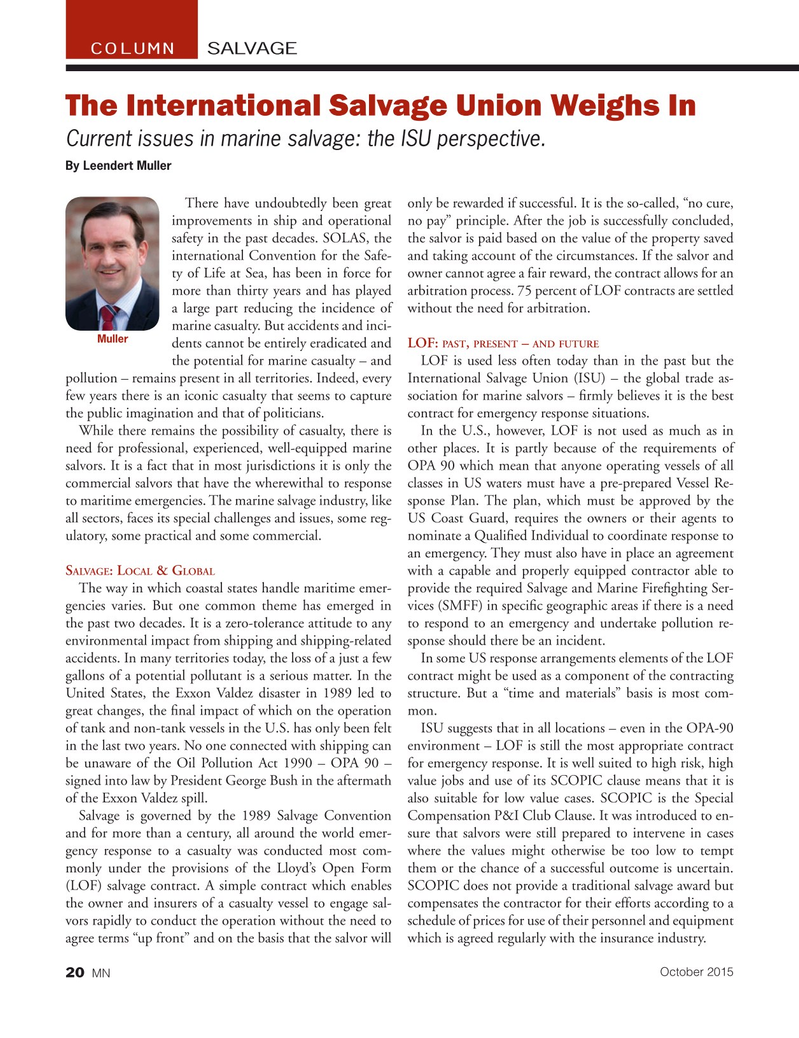
Page 20: of Marine News Magazine (October 2015)
Salvage & Spill Response
Read this page in Pdf, Flash or Html5 edition of October 2015 Marine News Magazine
COLUMN SALVAGE
The International Salvage Union Weighs In
Current issues in marine salvage: the ISU perspective.
By Leendert Muller
There have undoubtedly been great only be rewarded if successful. It is the so-called, “no cure, improvements in ship and operational no pay” principle. After the job is successfully concluded, safety in the past decades. SOLAS, the the salvor is paid based on the value of the property saved international Convention for the Safe- and taking account of the circumstances. If the salvor and ty of Life at Sea, has been in force for owner cannot agree a fair reward, the contract allows for an more than thirty years and has played arbitration process. 75 percent of LOF contracts are settled a large part reducing the incidence of without the need for arbitration. marine casualty. But accidents and inci-
Muller
PAST PRESENT AND FUTURE dents cannot be entirely eradicated and LOF: , – the potential for marine casualty – and LOF is used less often today than in the past but the pollution – remains present in all territories. Indeed, every International Salvage Union (ISU) – the global trade as- few years there is an iconic casualty that seems to capture sociation for marine salvors – ? rmly believes it is the best the public imagination and that of politicians. contract for emergency response situations.
While there remains the possibility of casualty, there is In the U.S., however, LOF is not used as much as in need for professional, experienced, well-equipped marine other places. It is partly because of the requirements of salvors. It is a fact that in most jurisdictions it is only the OPA 90 which mean that anyone operating vessels of all commercial salvors that have the wherewithal to response classes in US waters must have a pre-prepared Vessel Re- to maritime emergencies. The marine salvage industry, like sponse Plan. The plan, which must be approved by the all sectors, faces its special challenges and issues, some reg- US Coast Guard, requires the owners or their agents to ulatory, some practical and some commercial. nominate a Quali? ed Individual to coordinate response to an emergency. They must also have in place an agreement
ALVAGE OCAL LOBAL
S : L & G with a capable and properly equipped contractor able to
The way in which coastal states handle maritime emer- provide the required Salvage and Marine Fire? ghting Ser- gencies varies. But one common theme has emerged in vices (SMFF) in speci? c geographic areas if there is a need the past two decades. It is a zero-tolerance attitude to any to respond to an emergency and undertake pollution re- environmental impact from shipping and shipping-related sponse should there be an incident.
accidents. In many territories today, the loss of a just a few In some US response arrangements elements of the LOF gallons of a potential pollutant is a serious matter. In the contract might be used as a component of the contracting
United States, the Exxon Valdez disaster in 1989 led to structure. But a “time and materials” basis is most com- great changes, the ? nal impact of which on the operation mon.
of tank and non-tank vessels in the U.S. has only been felt ISU suggests that in all locations – even in the OPA-90 in the last two years. No one connected with shipping can environment – LOF is still the most appropriate contract be unaware of the Oil Pollution Act 1990 – OPA 90 – for emergency response. It is well suited to high risk, high signed into law by President George Bush in the aftermath value jobs and use of its SCOPIC clause means that it is of the Exxon Valdez spill. also suitable for low value cases. SCOPIC is the Special
Salvage is governed by the 1989 Salvage Convention Compensation P&I Club Clause. It was introduced to en- and for more than a century, all around the world emer- sure that salvors were still prepared to intervene in cases gency response to a casualty was conducted most com- where the values might otherwise be too low to tempt monly under the provisions of the Lloyd’s Open Form them or the chance of a successful outcome is uncertain. (LOF) salvage contract. A simple contract which enables SCOPIC does not provide a traditional salvage award but the owner and insurers of a casualty vessel to engage sal- compensates the contractor for their efforts according to a vors rapidly to conduct the operation without the need to schedule of prices for use of their personnel and equipment agree terms “up front” and on the basis that the salvor will which is agreed regularly with the insurance industry.
October 2015 20
MN
MN Oct15 Layout 18-31.indd 20 9/21/2015 11:08:32 AM

 19
19

 21
21
